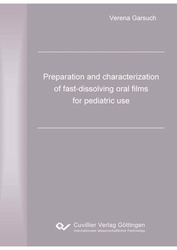| Departments | |
|---|---|
| Book Series (97) |
1383
|
| Nachhaltigkeit |
3
|
| Gesundheitswesen |
1
|
| Humanities |
2379
|
| Natural Sciences |
5409
|
| Mathematics | 228 |
| Informatics | 320 |
| Physics | 980 |
| Chemistry | 1365 |
| Geosciences | 131 |
| Human medicine | 243 |
| Stomatology | 10 |
| Veterinary medicine | 108 |
| Pharmacy | 147 |
| Biology | 835 |
| Biochemistry, molecular biology, gene technology | 121 |
| Biophysics | 25 |
| Domestic and nutritional science | 45 |
| Agricultural science | 1005 |
| Forest science | 201 |
| Horticultural science | 20 |
| Environmental research, ecology and landscape conservation | 148 |
| Engineering |
1799
|
| Common |
97
|
|
Leitlinien Unfallchirurgie
5. Auflage bestellen |
|
Advanced Search
Preparation and characterization of fast-dissolving oral films for pediatric use (English shop)
Verena Ingeborg Garsuch (Author)Preview
Table of Contents, Datei (35 KB)
Extract, Datei (41 KB)
Oral films, also called oral wafers, are intended for the application in the oral cavity and they are an innovative and promising dosage form especially for use in pediatrics and geriatrics. On the one hand the studies focused on the development of such a dosage form for pediatric use with an appropriate active substance. On the other hand it was planned to develop adequate analytical methods for their characterization as well as improving already existing approaches.
Drug-free films were prepared according to the patent literature starting with a pre-evaluation of different film formers such as cellulose ethers, polyethylene glycol-polyvinyl alcohol copolymer (Kollicoat® IR), pullulan and sodium alginate. Gelatin, hypromellose, polyvinyl alcohol and pullulan were evaluated for further use in drug-loaded oral films in which caffeine was chosen as the API. The best compromise between fast dissolution and pleasant taste was shown for oral films made of gelatin and pullulan. Improving their palatability by using different sweeteners, flavors and dyes led to two formulations with pleasant taste without any bitterness.
The oral films, based on different formulations, were evaluated with regard to their morphology, mechanical and thermal properties. Recrystallization of caffeine occurred within the drug-loaded oral wafers, which led to non-uniform distribution of API and caused limited content uniformity for oral wafers made of gelatin and one hypromellose type (HM50PA2910). Furthermore, residual solvent was determined by different methods. In the formulations that contained ethanol as solvent, this alcohol could not be quantified in the finished products making the oral wafers safe for pediatric use. The results from the investigations of osmolalities of dissolved films in appropriate medium showed values far below the critical threshold for cell necrosis which additionally approves the applicability of oral wafers to pediatrics.
An attempt to simulate the disintegration and dissolution behavior in the human oral cavity was made by developing methods using a fiber-optic sensor, contact angle meter or determination of swelling. Since only a small amount of saliva is present in the oral cavity, the development of an adequate method proved to be difficult. It was revealed that oral wafers showed fast-dissolving behavior, both in vitro and in vivo, although they had a drug-load of 10 mg caffeine.
However, the present study revealed that recrystallization of API may be problematic. Further studies should be aimed at preventing the recrystallization which occurred in the case of caffeine. The developed approaches, especially for dissolution testing, should be improved to better mimic the natural conditions. Adequate methods to determine mucoadhesion are another possibility for prediction of the suitability of film formers for use in the oral cavity. Ultimately, the packaging of those oral wafers will play a considerable role in ascertaining and increasing their stability.
In conclusion, in the present work, the development of oral drug-loaded wafers was successful. Although the wafers contain 10 mg caffeine, which is a bitter tasting substance, the taste was assessed as comfortable and pleasant. The manufactured oral wafers were characterized by several methods and found out to be stable even without primary packaging. An evaluation of appropriate film formers for oral use could be undertaken.
| ISBN-13 (Printausgabe) | 3869550155 |
| ISBN-13 (Hard Copy) | 9783869550152 |
| ISBN-13 (eBook) | 9783736930155 |
| Language | English |
| Page Number | 140 |
| Edition | 1 Aufl. |
| Volume | 0 |
| Publication Place | Göttingen |
| Place of Dissertation | Universität Düsseldorf |
| Publication Date | 2009-06-24 |
| General Categorization | Dissertation |
| Departments |
Pharmacy
|








